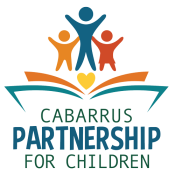Mental Health
The Mental Health Services offered by the Cabarrus Partnership for Children are designed to promote the emotional well-being of children and families across Cabarrus County. Through evidence-based programs and community partnerships, including early intervention, trauma-informed care, and clinical support via LiVe Well, these services aim to strengthen family relationships, build resilience, and support long-term mental health outcomes.
Turning Point Counseling
Parent-Child Interaction Therapy (PCIT) is an evidence-based, short-term treatment designed to help young children (2.5-7 years old) with highly disruptive behavior learn to control their frustration. In PCIT, we work with each parent/caregiver to strengthen their relationship with their child and build their confidence and ability to effectively guide and direct their child’s behavior, set limits, calmly discipline, and restore positive feelings to their interactions. PCIT treats the parent/caregiver, the child and most importantly their interactions.
PCIT helps to:
- Enhance your parent/child relationships and child management skills
- Increase your child’s ability to manage frustration
- Improve your child’s minding and listening skills
- Build your child’s confidence
- Encourage your child’s independence and self-control
- Improve your child’s attention skills
- Strengthen your child’s social skills
How It Works
PCIT is a coaching program that works with the parent and child together. Observing from behind a one-way mirror, the therapist coaches the parent through a wireless earphone on specific ways of relating to and managing the child’s behavior “at the moment.” PCIT consists of two phases: Relationship Enhancement and Child Management. In both phases, parents are taught specific skills that enables them to immediately put into practice what they have just learned. While typically the program consists of about 14 sessions, parents often report marked improvement in 3-4.
Concord, NC Office:
2353 Concord Lake Road, Ste 160
Concord, NC 28025
Office: 980-781-5156 | Fax: 980-781-5346
LiVe Well Counseling: A Division of the Cabarrus Health Alliance
LiVe Well Counseling is a service of the Cabarrus Health Alliance which provides outpatient behavioral health services (therapy) for ANYONE 5 and older in our community who is interested in improving their overall mental wellness.
Concord NC Office:
363 Church Street, N
Concord, NC 28025
704-920-1199
Adverse Childhood Experiences (ACEs)
Adverse Childhood Experiences (ACEs) threaten a child’s safety or security. Also called “trauma or toxic stress,” they are unpleasant, hurtful experiences. They cause health problems as an adult. If you have ACEs as a child, you pass the effects onto your children.
ACEs, can be traumatic events that occur in childhood (0-17 years).
For example:
- Experiencing violence, abuse, or neglect
- Witnessing violence in the home or community
- Having a family member attempt or die by suicide
Also included are parts of the child’s environment that can damage their sense of safety, stability, and bonding such as growing up in a household with:
- Substance abuse
- Mental health problems
- Instability due to parental separation or household members being in jail or prison
ACEs are interconnected to chronic health problems, mental illness, and substance abuse in adulthood. They can also adversely impact education and job opportunities. However, ACEs can be prevented (Source: CDC)

ACEs Resource Center
Facts About ACEs
How Big Is the Problem?
ACEs are common. About 61% of adults surveyed across 25 states reported that they had experienced at least one type of ACE, and nearly 1 in 6 reported they had experienced four or more types of ACEs.
Preventing ACEs could potentially reduce a large number of health conditions. For example, up to 1.9 million cases of heart disease and 21 million cases of depression could have been potentially avoided by preventing ACEs.
Some children are at greater risk than others. Women and several racial/ethnic minority groups were at greater risk for having experienced 4 or more types of ACEs.
ACEs are costly. The economic and social costs to families, communities, and society totals hundreds of billions of dollars each year.
Consequences
ACEs can have lasting, negative effects on health, well-being, and opportunity. These experiences can increase the risks of injury, sexually transmitted infections, maternal and child health problems, teen pregnancy, involvement in sex trafficking, and a wide range of chronic diseases and leading causes of death such as cancer, diabetes, heart disease, and suicide.
ACEs and associated conditions, such as living in under-resourced or racially segregated neighborhoods, frequently moving, and experiencing food insecurity, can cause toxic stress (extended or prolonged stress). Toxic stress from ACEs can change brain development and affect such things as attention, decision-making, learning, and response to stress.
Children growing up with toxic stress may have difficulty forming healthy and stable relationships. They may also have unstable work histories as adults and struggle with finances, jobs, and depression throughout life. These effects can also be passed on to their own children. Some children may face further exposure to toxic stress from historical and ongoing traumas due to systemic racism or the impacts of poverty resulting from limited educational and economic opportunities.
(Source: CDC, Preventing Adverse Childhood Experiences | Violence Prevention)
Videos to Watch
Adverse Childhood Experiences Overview (Baptist Memorial Health Care)
Dr. Robert Anda: What Does the ACE Score Mean?
Preventing Adverse Childhood Experiences Online Training Module 1, Lesson 1 (CDC)
Preventing Adverse Childhood Experiences Online Training Module 2, Lesson 1 (CDC)
Articles
- “A Different Distribution of Power”: ACEs, Trauma and Resilience Networks Sharpen Focus on Racial Justice and Equity (ACEs Connection)
- “Parenting in an Age of Uncertainty with Dr. Ken Ginsburg” (ACEs Connection)
- “Supporting Children’s Development During the Pandemic” (The New Yorker)
- Marijuana and Pregnancy (SAMHSA)
- “Children Who Get Hugs Tend to Become Happier Adults” (ACEs Connection)
